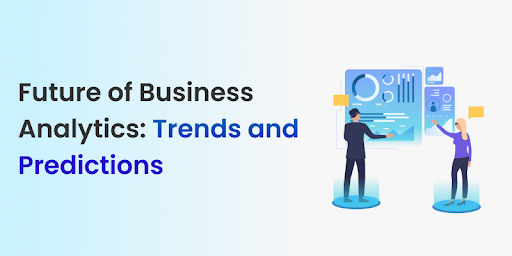
Future of Business Analytics: Trends and Predictions
Business analytics has become a vital component for organizations seeking to obtain insights, make educated choices, and drive development in today’s data-driven environment. The area of business analytics is continually growing as technology advances.
A Business Analytics Course equips individuals with the necessary skills and knowledge to navigate the future of the field, staying updated on emerging trends, leveraging AI and ML techniques, and making data-driven decisions for organizations’ success in the data-driven economy.
Table of Contents
ToggleAdvantages of Business analytics
Business analytics, as a powerful tool for extracting insights from data, offers numerous advantages to organizations across various industries. Here are some key advantages of business analytics:
- Informed Decision-Making: Business analytics provides organizations with accurate and relevant information, enabling them to make informed decisions. By analyzing data from multiple sources, such as customer behavior, market trends, and operational metrics, businesses can gain valuable insights and align their strategies accordingly. Data-driven decision-making reduces guesswork and minimizes risks, leading to more successful outcomes.
- Improved Efficiency and Productivity: By leveraging business analytics, organizations can identify inefficiencies in their processes and operations. Analytics can uncover bottlenecks, areas of waste, and opportunities for improvement. By optimizing workflows and resource allocation, businesses can enhance efficiency, streamline operations, and increase productivity. This, in turn, leads to cost savings and a competitive edge.
- Enhanced Customer Understanding: Understanding customers is crucial for any business. Business analytics helps organizations gain deep insights into customer behavior, preferences, and needs. By analyzing customer data, businesses can segment their customer base, identify trends, and personalize their products, services, and marketing efforts. This personalized approach improves customer satisfaction, retention, and loyalty.
- Competitive Advantage: In today’s competitive landscape, businesses need to stay ahead of their rivals. Business analytics enables organizations to gain a competitive advantage by identifying market trends, monitoring competitors, and identifying opportunities for differentiation. By leveraging data-driven insights, businesses can make proactive decisions, adapt to changing market dynamics, and stay ahead of the competition.
- Risk Management: Every business faces risks, and effective risk management is vital for long-term success. Business analytics allows organizations to identify and mitigate potential risks by analyzing historical data and identifying patterns. By understanding risk factors, businesses can develop strategies to mitigate them and make data-driven decisions to minimize potential losses.
- Targeted Marketing and Sales: Business analytics enables organizations to optimize their marketing and sales efforts. By analyzing customer data, businesses can identify the most profitable customer segments, target them with tailored marketing campaigns, and optimize their sales processes. Analytics also helps in evaluating the effectiveness of marketing campaigns and refining strategies based on data-driven insights, leading to higher conversion rates and increased revenue.
- Improved Forecasting and Planning: Business analytics equips organizations with tools to forecast future trends and plan accordingly. By analyzing historical data, market trends, and external factors, businesses can make accurate predictions about demand, sales, and resource requirements. This enables organizations to optimize inventory levels, manage supply chains more efficiently, and make strategic decisions with a long-term perspective.
- Fraud Detection and Prevention: Business analytics plays a crucial role in fraud detection and prevention. By analyzing patterns and anomalies in data, organizations can identify potential fraudulent activities and take appropriate measures to prevent them. Analytics helps in monitoring transactions, detecting suspicious patterns, and implementing fraud prevention strategies, safeguarding organizations’ assets and reputation.
- Continuous Improvement and Innovation: Business analytics fosters a culture of continuous improvement and innovation within organizations. By analyzing performance metrics and customer feedback, businesses can identify areas for improvement and innovation. Analytics provides insights into emerging trends, customer demands, and market opportunities, enabling organizations to stay agile and adapt to changing business landscapes.
- Real-Time Insights: With advancements in technology, business analytics can provide real-time insights into various aspects of the business. Real-time analytics enables organizations to monitor and respond to events as they occur, enabling agile decision-making and proactive actions. Real-time insights are particularly valuable in industries that require immediate response, such as finance, e-commerce, and customer support.
In this blog article, we will look into the future of business analytics, reviewing new trends and offering forecasts for the coming years.
Artificial Intelligence and Machine Learning:
Artificial intelligence (AI) and machine learning (ML) are transforming corporate analytics. AI-powered algorithms and machine learning models can analyse massive volumes of data, detect trends, and make accurate predictions. We can expect AI and ML to play an even larger role in corporate analytics in the future, automating jobs, improving decision-making processes, and driving innovation.
AI-powered analytics systems will be able to analyse data in real time, allowing organisations to adapt quickly to changing market situations. Machine Learning algorithms will advance more, resulting in more exact forecasts and suggestions. Furthermore, artificial intelligence-powered natural language processing (NLP) approaches will enable organisations to extract insights from unstructured data sources such as customer reviews, social media postings, and emails.
Predictive and Prescriptive Analytics:
Predictive and prescriptive analytics will dominate the future of business analytics. While descriptive analytics gives insights into what has occurred in the past, predictive analytics forecasts future events using historical data and statistical models. Prescriptive analytics takes it a step further by recommending actions based on the forecasts.
Predictive and prescriptive analytics will become more accurate and actionable as big data becomes more widely available and AI and machine learning develop. Companies will be able to predict customer behaviour, spot trends, optimise supply chains, and make data-driven choices with more certainty.
Data Privacy and Ethical Considerations:
Concerns about data privacy and ethical considerations will rise to the fore as data becomes the lifeblood of corporate analytics. With tougher rules in place, such as the General Data Protection Regulation (GDPR), organisations must prioritise data governance, security, and privacy.
Businesses will focus on developing clear data practises, acquiring correct permission, and adopting strong security measures to secure consumer data in the future. To ensure responsible and impartial decision-making, ethical factors such as algorithmic fairness and bias reduction will become critical.
Augmented Analytics:
Augmented Analytics is an emerging trend that combines AI and human intuition to provide more meaningful insights. It leverages AI algorithms to automate data preparation, analysis, and visualization, empowering business users with self-service analytics capabilities.
In the future, augmented analytics tools will become more sophisticated, enabling users with varying levels of technical expertise to explore data, generate reports, and gain insights effortlessly. Natural language querying and voice-based interactions will make analytics accessible to non-technical users, democratizing data-driven decision-making across organizations.
Internet of Things (IoT) Analytics:
The expansion of Internet of Things (IoT) devices generates massive volumes of data from a variety of sources, including sensors, wearables, and linked gadgets. IoT analytics include gathering, analysing, and interpreting data in order to increase operational efficiency, optimise processes, and improve consumer experiences.
IoT analytics will become increasingly important in business analytics in the future. Organisations will be able to spot abnormalities, forecast equipment breakdowns, and optimise resource allocation if they can harness real-time data from IoT devices. IoT data combined with AI and ML will drive innovation across industries such as manufacturing, healthcare, transportation, and retail.


